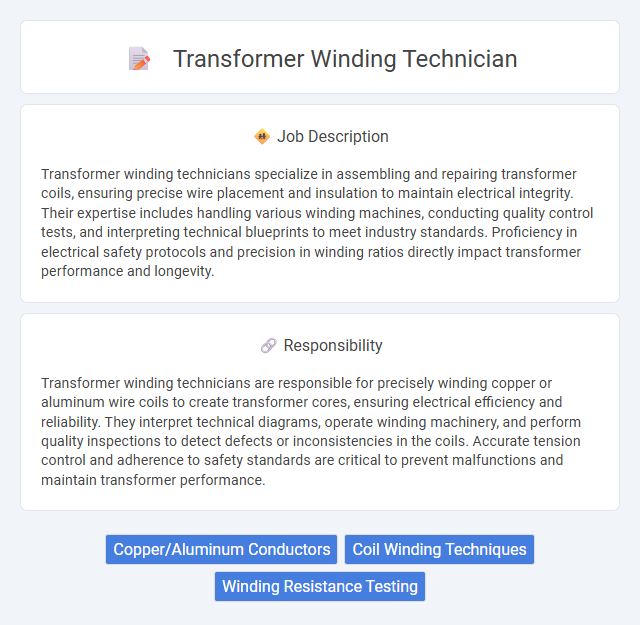
Transformer winding technicians specialize in assembling and repairing transformer coils, ensuring precise wire placement and insulation to maintain electrical integrity. Their expertise includes handling various winding machines, conducting quality control tests, and interpreting technical blueprints to meet industry standards. Proficiency in electrical safety protocols and precision in winding ratios directly impact transformer performance and longevity.
Individuals with strong attention to detail, good manual dexterity, and the ability to work in confined or physically demanding spaces will likely be suitable for a transformer winding technician job. Those who may struggle with repetitive tasks, precision work, or standing for long periods might find the job challenging. The role probably requires patience, technical aptitude, and a safety-conscious mindset, making it more appropriate for individuals who possess both mechanical skills and a careful approach to their work.
Qualification
A Transformer Winding Technician requires specialized skills in electrical engineering and hands-on experience with winding machines, coil manufacturing, and insulation processes. Proficiency in reading technical drawings, understanding transformer specifications, and adhering to safety standards is essential for accurate coil assembly and repair. Certification in electrical maintenance or transformer technology significantly enhances job readiness and career advancement opportunities.
Responsibility
Transformer winding technicians are responsible for precisely winding copper or aluminum wire coils to create transformer cores, ensuring electrical efficiency and reliability. They interpret technical diagrams, operate winding machinery, and perform quality inspections to detect defects or inconsistencies in the coils. Accurate tension control and adherence to safety standards are critical to prevent malfunctions and maintain transformer performance.
Benefit
Transformer winding technician jobs likely offer competitive salaries and opportunities for specialized skill development in electrical engineering and maintenance. Technicians may benefit from hands-on experience with advanced equipment and the potential for career growth in power generation and distribution industries. Job stability and access to comprehensive training programs could also be probable advantages in this role.
Challenge
Transformer winding technician roles likely involve complex challenges due to the precision required in handling intricate coil designs and ensuring electrical integrity. The probability of encountering issues like insulation abnormalities or alignment errors may necessitate advanced problem-solving skills and detailed attention. Mastery in managing these obstacles could be essential to maintain transformer performance and reliability.
Career Advancement
Transformer winding technicians gain specialized expertise in coil winding, insulation, and quality control, which opens pathways to senior technical roles and supervisory positions. Mastery of advanced winding techniques and diagnostic tools enhances opportunities for project management and engineering support roles within the power industry. Career advancement often involves certifications and hands-on experience, leading to higher salaries and leadership responsibilities in transformer manufacturing and maintenance.
Key Terms
Copper/Aluminum Conductors
Transformer winding technicians specialize in handling copper and aluminum conductors to fabricate and repair transformer windings with precision. They ensure correct conductor placement, insulation, and tightness to enhance electrical performance and minimize losses. Mastery of conductor materials and adherence to safety standards are critical for maintaining transformer reliability and efficiency.
Coil Winding Techniques
Transformer winding technicians specialize in coil winding techniques essential for constructing high-performance transformer coils with precise turns and tension control. Mastery of layer winding, helical winding, and disc winding methods ensures optimal insulation and magnetic flux distribution within transformer cores. Proficient use of winding machines and strict adherence to electrical standards contribute to the reliability and longevity of power transformers.
Winding Resistance Testing
Transformer winding technicians specialize in performing winding resistance testing to assess the integrity and condition of transformer coils. This testing detects issues such as shorted turns, poor connections, and winding deformations by measuring electrical resistance with precision instruments like micro-ohmmeters. Accurate winding resistance testing is critical for ensuring transformer reliability, preventing failures, and guiding maintenance decisions.
 kuljobs.com
kuljobs.com